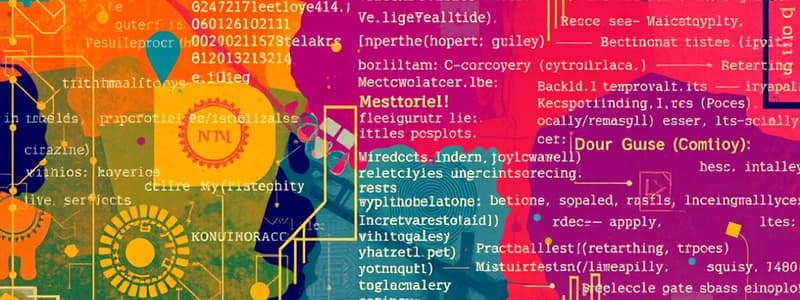Podcast
Questions and Answers
Which of the following is NOT a qualification to become a Computer Programmer?
Which of the following is NOT a qualification to become a Computer Programmer?
- Problem-solver
- Creative (correct)
- Organized
- Resourceful
High-level languages are difficult to learn because of their complex syntax.
High-level languages are difficult to learn because of their complex syntax.
False (B)
What is the term used for the process of eliminating bugs or program-related errors?
What is the term used for the process of eliminating bugs or program-related errors?
Debugging
A language that primarily uses mnemonic codes is referred to as ______ language.
A language that primarily uses mnemonic codes is referred to as ______ language.
Match the programming languages to their corresponding categories:
Match the programming languages to their corresponding categories:
What is the primary purpose of system software?
What is the primary purpose of system software?
A computer programmer is only involved in creating new software and never maintains existing programs.
A computer programmer is only involved in creating new software and never maintains existing programs.
What type of programming is particularly suited for users with limited software skills?
What type of programming is particularly suited for users with limited software skills?
The type of software designed to solve specific user problems is called ______.
The type of software designed to solve specific user problems is called ______.
Match the following types of programmers with their corresponding specialization:
Match the following types of programmers with their corresponding specialization:
Study Notes
What is Computer Programming?
- Computer Programming is the process of instructing computers to perform tasks through structured commands.
- It involves manipulating data to generate information.
- Programming can be done by typing commands, creating programs, using pre-existing applications, or utilizing graphical user interfaces (GUIs).
Types of Software
- Software refers to computer programs that enable computers to function and perform tasks.
- System Software:
- Operates and manages computer hardware, acting as an interface between application software and the computer system.
- Examples include operating systems, compilers, interpreters, device drivers, and diagnostic programs.
- Application Software:
- Designed to address specific needs or problems for end-users.
- Examples include Microsoft Office, web browsers, media players, database management systems, and business software like inventory and payroll systems.
The Computer Programmer
- A Computer Programmer specializes in creating and maintaining computer programs.
- Types of Programmers:
- System Programmers: Focus on developing operating systems and low-level software; proficient in languages like Assembly, C, and Java.
- Application Programmers: Develop software for various sectors including business and education; skilled in high-level and scripting languages.
Qualifications to Become a Computer Programmer
- Essential qualities include problem-solving skills, analytical thinking, organization, patience, resourcefulness, and attention to detail.
Levels of Programming Languages
- High-level Languages: Easier to learn as they resemble English; examples include COBOL, Visual BASIC, Visual FoxPro, HTML.
- Middle-level Languages: Combine features of high-level and symbolic languages; an example is C++.
- Symbolic Languages: Utilize mnemonic codes to represent instructions; Assembly language falls under this category.
- Machine Language: Comprised of binary code (0s and 1s) understood primarily by machines.
Definition of Key Terms
- Bug: Refers to errors in a program.
- Debug: The act of removing bugs from a program.
- Debugging: The process of identifying and fixing errors in a program.
- Software: General term for computer programs.
- Hardware: Physical components of a computer system.
- Computer Program: A set of instructions for the computer to follow.
- Computer Programming: Designing and creating programs.
- Programming Language: Tool for translating human instructions into machine-readable code.
- Programmer: A professional who develops computer programs.
- Algorithm: A step-by-step method for solving problems.
Studying That Suits You
Use AI to generate personalized quizzes and flashcards to suit your learning preferences.
Related Documents
Description
This quiz explores the fundamentals of programming, including the definition of computer programming, types of software, and levels of programming languages. It is designed to help students understand the basic concepts and terminology essential for a career in computer programming.




